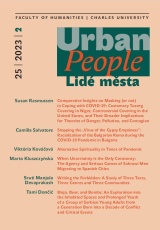Comparative Insights on Masking (or not) in Coping with Covid-19
Customary Tuareg Covering in Niger, Controversial Covering in the United States, and Their Broader Implications for Theories of Danger, Pollution, and Contagion
DOI:
https://doi.org/10.14712/12128112.3960Klíčová slova:
COVID-19, Tuareg, Africa, United States, pollution, symbolism, politicsAbstrakt
This article explores attitudes and practices regarding covering in comparative perspective, focusing on the mask and masking and their promotion in two very different cultural settings that nonetheless also share some broad similarities: Niger, with particular emphasis on the Tuareg case and the mediating roles of smith/artisans in dissemination of cultural knowledge and health education, and the United States, with particular emphasis on as mediators and Texas in these processes. There is analysis of the cultural-symbolic and socio-political re-workings of meanings and uses of masking in relation to these settings’ prevalent, widely-held mores concerning facial covering and their wider significance for understanding theories of danger, pollution, and contagion in anthropology.
Stahování
Publikováno
Jak citovat
Číslo
Sekce
Licence
Copyright (c) 2023 Susan Rasmussen

Tato práce je licencována pod Mezinárodní licencí Creative Commons Attribution 4.0 .


